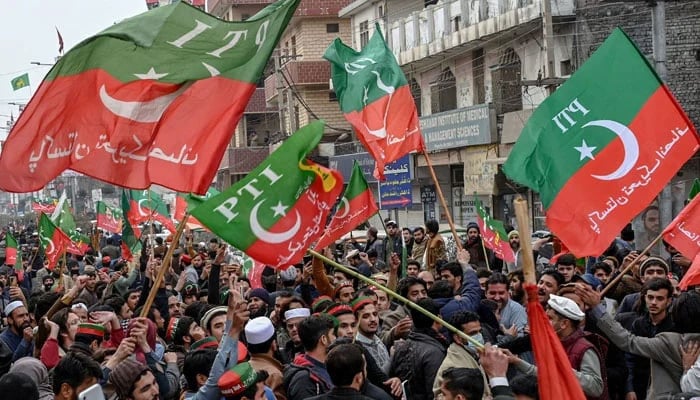Cracks within?
The way forward should be for the PTI leadership to make a proper strategy on how to deal with the current situation
Not all seems to be well in the House of the PTI, with reports of rifts within the party after the reserved seats fiasco. First it was Sher Afzal Marwat who admitted during a show on Geo News that the PTI had made a mistake by joining hands with the Sunni Ittehad Council (SIC) instead of the JUI-Sherani group or the Majlis Wahdat-e-Muslimeen (MWM). Then senior PTI leader Barrister Ali Zafar gave a statement agreeing with Marwat and saying that, on the directive of Imran Khan, the PTI decided to join the MWM, but the decision was changed the next day when ‘some people’ who met Imran Khan in Adiala jail came out and said the party would be going with the SIC. Zafar said that when he asked Imran Khan about this, the PTI founder said he had not changed his decision. Interestingly, on Friday SIC Chairman Sahibzada Hamid Raza warned the PTI not to wash their dirty laundry in public, saying he had a lot to reveal but had chosen not to share because of his commitment to Imran Khan’s cause. The SIC chief took a strong exception to Marwat’s comments and advised the PTI to put its house in order. He added that PTI members should not create divisions on someone’s instructions, clarifying that he had not requested the alliance and the decision to join the SIC was taken by Imran Khan.
There had been rumours and apprehensions that ever since PTI founder Imran Khan’s incarceration, too many groups within groups have mushroomed within his party. To the less partisan observer, it seems each group is angling for a specific agenda and interest rather than the party’s well-being. Media reports indicate that these groupings existed before within the political class of the PTI but have become more visible and pronounced after the party became populated with more and more lawyers. There has also been a lot of criticism on how the party’s legal teams are handling – or mishandling – different cases. And a lot of this cannot be discounted as mere speculations since statements by one party leader against the other have now become a norm in the PTI.
This sort of internal friction can hardly help an already besieged PTI. The way forward should be for the PTI leadership to make a proper strategy on how to deal with the current situation. Of course, it does not help when PTI leaders like Shahbaz Gill are seen holding demonstrations outside the International Monetary Fund (IMF) headquarters in Washington just when the government is engaging with the global lender over the release of the final tranche of the $3 billion Standby Arrangement (SBA). At the demonstration, PTI workers and leaders alleged that their party’s National Assembly seats were “reduced” to 90 from 180 in the general elections. Observers say that instead of alienating the state and the government, it is time the PTI engaged with all political stakeholders so that room can be made for Imran Khan’s eventual release. Many have appreciated that Khyber Pakhtunkhwa Chief Minister Ali Amin Gandapur met Prime Minister Shehbaz Sharif to discuss provincial matters with the federal government as this is how democracies work – by engaging with each other rather than viewing those across the aisle as mortal enemies. It is time for the entirety of Pakistan’s political class to grow up. Petulant politics should be left behind in school playgrounds. Parliament is not the place for this.
-
 Leonardo DiCaprio's Girlfriend Vittoria Ceretti Given 'greatest Honor Of Her Life'
Leonardo DiCaprio's Girlfriend Vittoria Ceretti Given 'greatest Honor Of Her Life' -
 Beatrice, Eugenie’s Reaction Comes Out After Epstein Files Expose Their Personal Lives Even More
Beatrice, Eugenie’s Reaction Comes Out After Epstein Files Expose Their Personal Lives Even More -
 Will Smith Couldn't Make This Dog Part Of His Family: Here's Why
Will Smith Couldn't Make This Dog Part Of His Family: Here's Why -
 Kylie Jenner In Full Nesting Mode With Timothee Chalamet: ‘Pregnancy No Surprise Now’
Kylie Jenner In Full Nesting Mode With Timothee Chalamet: ‘Pregnancy No Surprise Now’ -
 Laura Dern Reflects On Being Rejected Due To Something She Can't Help
Laura Dern Reflects On Being Rejected Due To Something She Can't Help -
 HBO Axed Naomi Watts's 'Game Of Thrones' Sequel For This Reason
HBO Axed Naomi Watts's 'Game Of Thrones' Sequel For This Reason -
 King Charles' Sandringham Estate Gets 'public Safety Message' After Andrew Move
King Charles' Sandringham Estate Gets 'public Safety Message' After Andrew Move -
 Lewis Capaldi Sends Taylor Swift Sweet Message After 'Opalite' Video Role
Lewis Capaldi Sends Taylor Swift Sweet Message After 'Opalite' Video Role -
 Brooklyn Beckham Plunges Victoria, David Beckham Into Marital Woes: ‘They’re Exhausted As It Seeps Into Marriage
Brooklyn Beckham Plunges Victoria, David Beckham Into Marital Woes: ‘They’re Exhausted As It Seeps Into Marriage -
 Sarah Ferguson Joins Andrew In ‘forcing’ Their Daughters Hand: ‘She Can Lose Everything’
Sarah Ferguson Joins Andrew In ‘forcing’ Their Daughters Hand: ‘She Can Lose Everything’ -
 'Bridgerton' Author Reveals If Actors Will Be Recast In Future Seasons
'Bridgerton' Author Reveals If Actors Will Be Recast In Future Seasons -
 50 Cent Super Bowl Ad Goes Viral
50 Cent Super Bowl Ad Goes Viral -
 'The Housemaid' Lifts Company's Profits: Here's How
'The Housemaid' Lifts Company's Profits: Here's How -
 Michael Douglas Recalls Director's Harsh Words Over 'Wall Street' Performance
Michael Douglas Recalls Director's Harsh Words Over 'Wall Street' Performance -
 Henry Czerny On Steve Martin Created Humor On 'Pink Panther' Set
Henry Czerny On Steve Martin Created Humor On 'Pink Panther' Set -
 Lady Victoria Hervey: Andrew Mountbatten-Windsor's Ex-girlfriend Proud Of Being On Epstein Files
Lady Victoria Hervey: Andrew Mountbatten-Windsor's Ex-girlfriend Proud Of Being On Epstein Files




